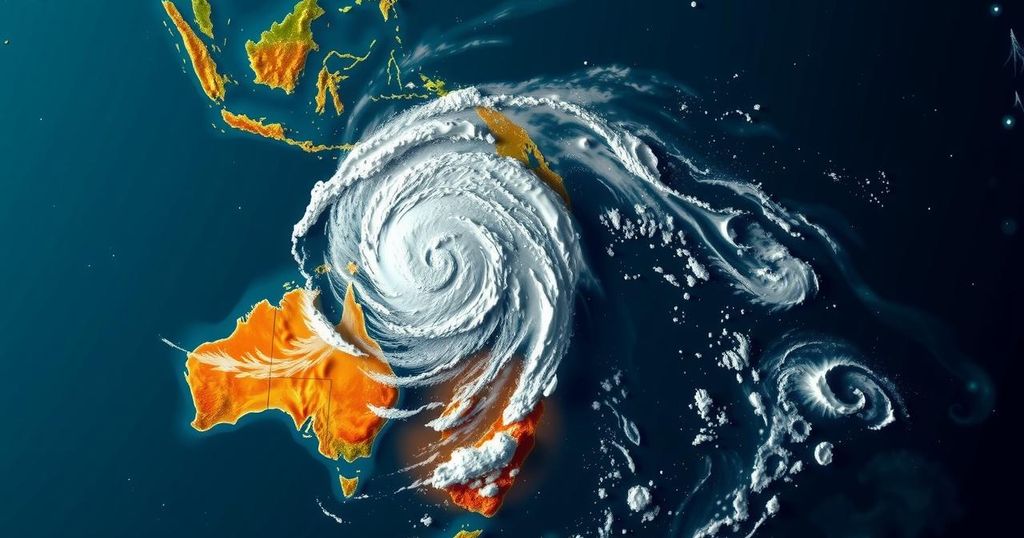Weather Tracker: Hurricane Oscar Strengthens in the Atlantic Amid Record Heat in Australia

Hurricane Oscar, the 10th hurricane of 2024, struck the Turks and Caicos and southern Bahamas, transitioning rapidly from a tropical storm. Meanwhile, Australia experiences record high temperatures, exacerbating severe weather conditions, including thunderstorms and flooding, particularly affecting New South Wales and Victoria.
Hurricane Oscar has formed as the tenth hurricane of the 2024 Atlantic season, striking the Turks and Caicos Islands on Saturday night and impacting the southern Bahamas on Sunday. Initially, the US National Hurricane Center had assessed the disturbance that led to Oscar as unlikely to develop, beginning on October 10 as a tropical wave over western Africa, which produced thunderstorms and gusty winds in the Cabo Verde Islands before progressing toward the Atlantic. Obstacles such as dry air hampered its organization; however, by the morning of October 19, while north of Puerto Rico and still uncertain in its development potential, the storm evolved rapidly within a matter of hours due to intensified thunderstorm activity, leading to its classification as a tropical storm and subsequent naming as Oscar. Hurricane hunters then verified hurricane-force winds within the system, culminating in Oscar’s upgrade to hurricane status. The cyclone is projected to affect eastern Cuba on Monday, followed by a northward trajectory that will likely result in its transition to a powerful extratropical cyclone, bringing wind gusts that may exceed 70 mph to southeastern Canada later in the week. Meanwhile, the remnants of tropical storm Nadine are anticipated to regenerate into another tropical system south of Mexico, progressing westward without significant land impacts. In Australia, temperatures in October have continually exceeded average norms, following record-breaking warmth in August and September. In the past week, much of southern and eastern Australia experienced daily highs in the high 30s and low 40s Celsius, significantly surpassing the October average. For instance, South Australia recorded its hottest temperature in 29 years, with Coober Pedy reaching 43.7 °C. Concurrently, parts of Queensland experienced temperatures up to 11 °C above average this weekend. This heat has contributed to severe thunderstorms and heavy rain outbreaks, particularly across New South Wales and Victoria. On Friday, torrential downpours resulted in flash flooding, with one town in Victoria receiving 50 mm of rain within just 45 minutes, accompanied by destructive hail, fierce winds, and around half a million lightning strikes. Projected conditions indicate that the ongoing heatwave will migrate to northern Western Australia, where nighttime temperatures may remain elevated at above 30 °C later this week.
The current meteorological events detailed involve Hurricane Oscar in the Atlantic and extreme heat in Australia. Hurricane Oscar emerged from a tropical wave that initially showed low potential for further development, yet rapidly intensified to hurricane status due to favorable atmospheric conditions. The analysis of tropical storms and hurricanes is crucial given their potential impact on coastal regions and the requirement for preparedness and response measures. Additionally, the continuing heatwave in Australia reflects significant climatic trends leading to record high temperatures, drought conditions, and severe weather events, prompting discussions on climate change and its implications for global weather patterns.
In summary, Hurricane Oscar has developed into a significant Atlantic hurricane impacting several islands and is poised to strengthen as it approaches eastern Cuba and later parts of Canada. Concurrently, Australia is grappling with unprecedented temperatures, leading to severe weather conditions and public safety concerns. The juxtaposition of these two events underlines the unpredictable nature of our current climate and the necessity for ongoing monitoring and preparedness against extreme weather phenomena.
Original Source: www.theguardian.com







